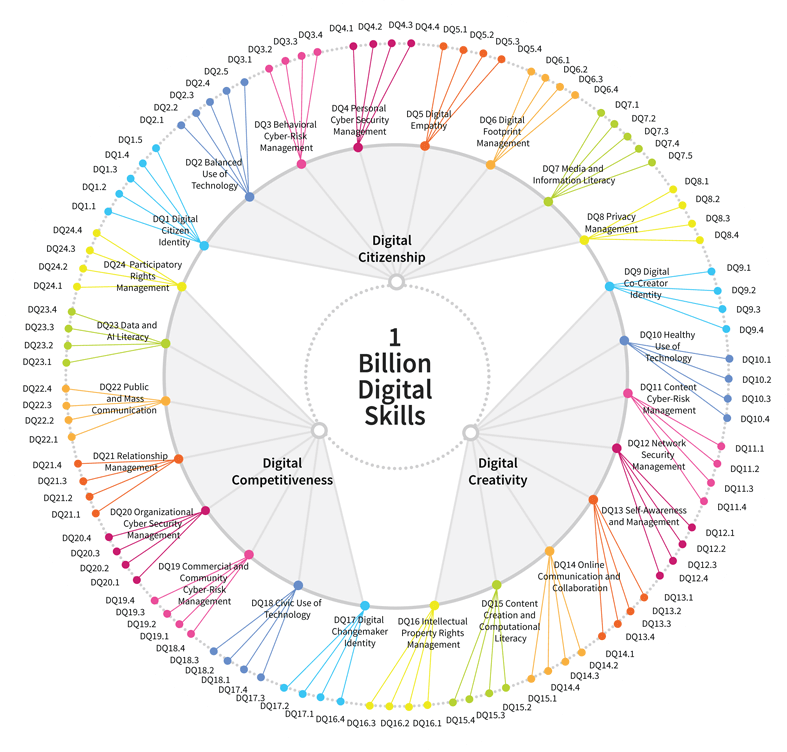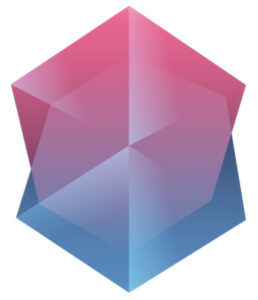
Digital Wellbeing is the ability to understand the positive and negative impact of engaging with digital technology and maintain a healthy relationship with technology in a balanced way.
With our partners across the world, we are building a Global Digital Wellbeing Alliance to promote digital wellbeing through healthy use of digital technology, to be a research hub for digital wellbeing, and to identify top digital wellbeing programs in the world.
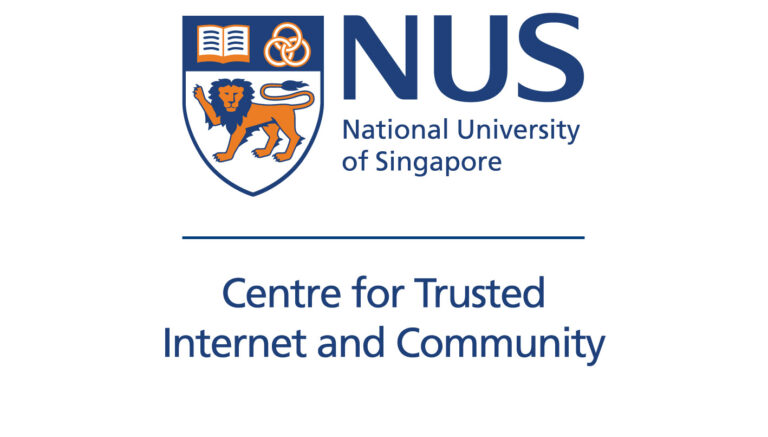
NUS-CTIC launched a “Living Well Digitally” initiative that introduces the world’s first digital wellbeing indicator framework, assessment tool, and resources for the global community.
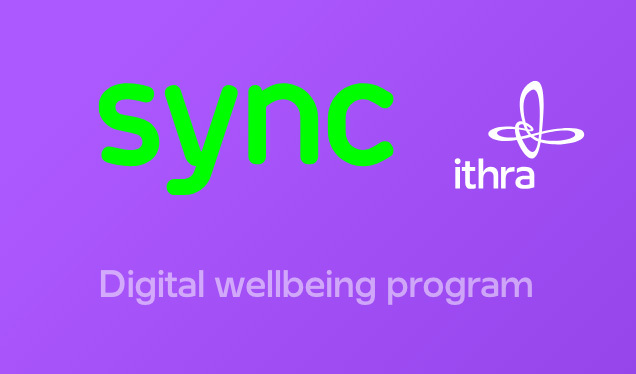
SYNC is a digital well-being initiative with a vision to create a world where we are all in control of our digital lives.

Mission to understand and promote positive and healthy digital media experiences for young people, from birth through young adulthood.
A Digital Intelligent Nation means that its citizens and organizations have holistic competencies to achieve well-being, prosperity, and safety/security in the digitized society. In other words, the DQ Index measures the progress of human-centered digital transformation of nations.
The DQ Index is being co-created with partners to be an aggregated measurement for the following thematic pillars by defining the “digital competence” of all stakeholders in the ecosystem, thereby continuing to be relevant, evolving, and transparent.
Check out our work-in-progress collaborative R&D with various partners. The inaugural real-time DQ Index with the outcomes will be released in 2022.







For each thematic pillar, we co-design meaningful indicators across the three main dimensions. Join us in developing indicators that contribute to the design and implementation of effective policies and practices that drive to close the digital skills gaps.
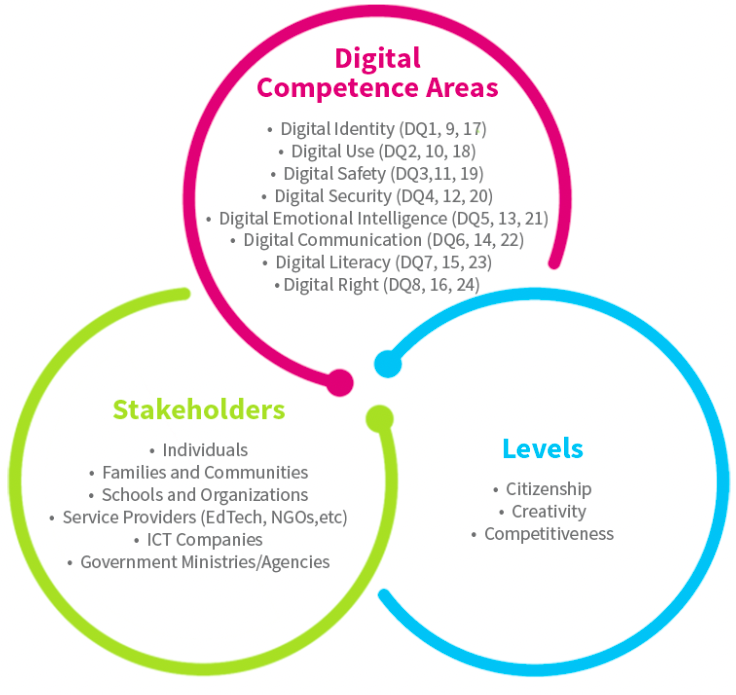
The current UN Sustainable Development Goals (SDG) measurement indicators have not yet fully laid out digital components. The DQ Index aims to be directly aligned with several Sustainable Development Goals (SDG3, SDG 4, SDG 8, SDG 10) and support to the development of indicators related to the digital ecosystem.Learn More.
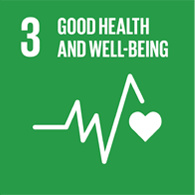

We standardize digital intelligence measurement. Each country or organization has their own digital skills framework / program tailored to their own digital transformation agenda. Just like how the SWIFT code facilitates inter- banking transactions, the DQ Global Standards can serve as the inter-operable common language that translates competencies in one framework to match with another’s.
It enables any nation, company, group, or organization to:
In this way, the DQ Index can measure the level and progress of digital intelligence of nations in an integrated manner that is standardized and searchable.


We’ll help your program align with the DQ Global Standards at a granular level through our DQ Micro-Badge (MB) system.

We’ll help you identify the international reference programs in the DQ program bank that have the best content in relation to your program’s identified DQ MBs. By comparing your program with selected international benchmarks, you can identify your program’s strengths and weaknesses, and enhance the areas for improvement as necessary.

Your program can undergo the DQ Seal process to gain acknowledgement on your program’s alignment with the DQ Global Standards. At the same time, your program will be included in the DQ program bank to likewise be an international benchmark program.

A white-labelled, customized API tool for assessment and scoring can be developed for you. Based on an AI-based linking and prediction methodology, your program can measure the levels of digital skills on an individual and organizational level as compared to national and global averages, and can be linked with the DQ Index.

Based on the DQ Index, meaningful and quantifiable measurement of your program’s impact will be generated. Being part of DQ Index, your program will further help inform various stakeholders, including policy makers in your nation and/or region, in continuously identifying and closing the digital skills gaps.
We are building an international collaborative R&D network to develop the DQ Index as a standardized and searchable metric to monitor global, national, and local progress on digital intelligence, and identify the digital skills gap. The goal is to build an efficient and coordinated R&D network by connecting ongoing digital skills research and initiatives and leveraging the strengths of each effort. Here, we have highlighted some of our collaborative projects with partners in each thematic pillar of the DQ Index.
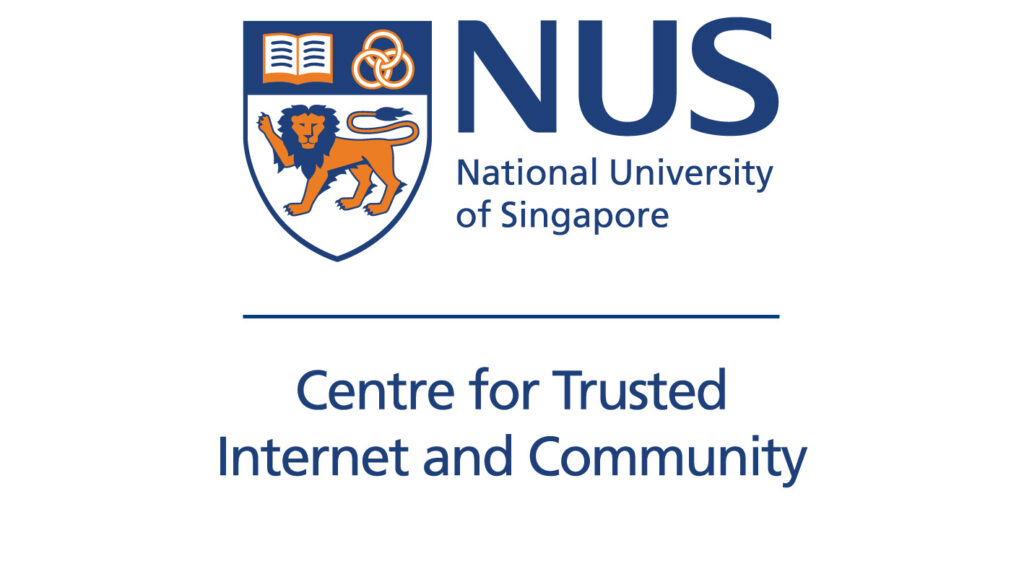
“Wellbeing is central to our personal health and the health of our societies. Having a balanced sense of self makes us more resilient to cultural and social complexities. It improves our quality of life and fosters the cohesion of our communities. NUS-CTIC’s aim is to promote research towards a more trusted Internet and community. Key here is the role of digital literacy to enhance digital wellbeing. The DQ Index provides a barometer to evaluate these competencies.”
– Professor Audrey Yue, Deputy Director (Research)
Collaborator: National University of Singapore – Centre for Trusted Internet and Community (NUS-CTIC)
Developed in partnership with the DQ Institute, the initiative aims to educate, engage, and empower individuals around the world with the knowledge and tools to navigate the complexities of the digital world, fostering a more balanced and informed digital lifestyle. The initiative introduces Digital Wellbeing Indicator Framework (DWIF), Digital Wellbeing assessment tool, and accessible resources for the community. The DQ Institute aligns the DWIF framework with the IEEE DQ Global Standards (IEEE 3527.1TM), develops the codification, and co-develops its assessment indicators based on the DQ Index.
Link to the initiative: https://ctic.nus.edu.sg/living-well-digitally/
Link to the press release: https://www.dqinstitute.org/news-post/living-well-digitally-global-initiative-launched-by-nus-centre-for-trusted-internet-and-community-and-powered-by-dq/
Link to the report: https://ctic.nus.edu.sg/resources/CTIC-WP-01(2021).pdf
Proposed Framework on Digital Wellbeing
| Digital Safety & Security | Digital Rights & Responsibilities | Digital Communication | Digital Emotional Intelligence | Digital Creativity | Digital Health & Self-Care | Digital Consumerism | Digital Employment & Entrepreneurship |
Digital Activism/Civic Participation |
|---|---|---|---|---|---|---|---|---|
| Safe and Secure Use | Rights and Responsibilities Online | Communicative Literacy | Emotional Literacy | Creative Literacy and Expression | e-Health Literacy | Consumer Awareness and Literacy | Productivity Skills | Digital Political Literacy |
| Secure Identity Management | Responsible Netizen Identity | Participation and Identity Formation | Empathy | Content Creation and Evaluation | Self-care and Reputation | Autonomy and Data Management | Career Identity | Digital Political Identity |
| Safe Online Participation | Digital Footprint Management | Collaboration and Communication | Solitary and Relationship Management | Digital Creativity and Innovation | Healthcare and Social Wellbeing | Consumer Rights and Competencies | Innovation and Entrepreneurship | Digital Political Activism |
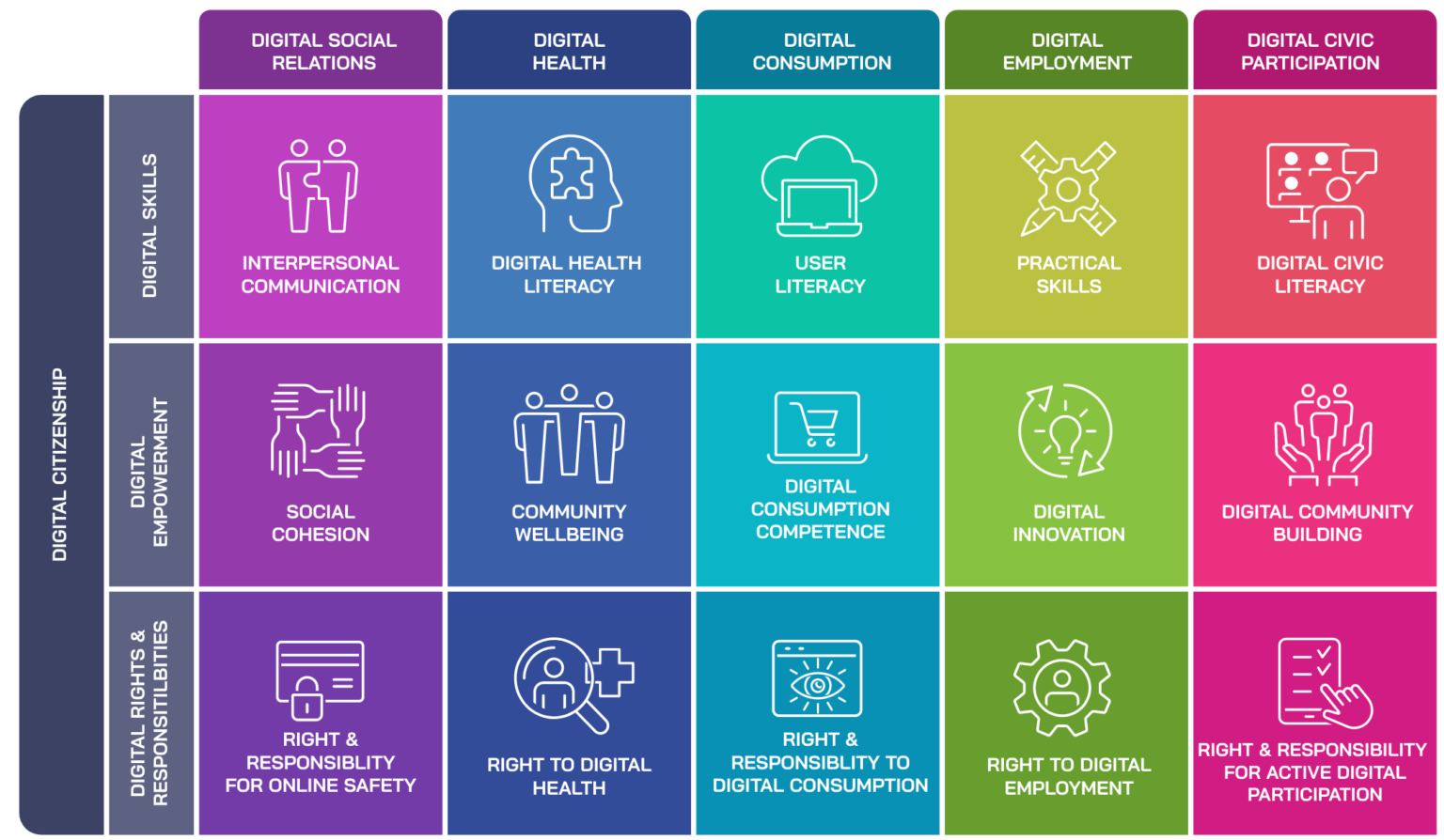

SYNC is a digital well-being initiative that aims to raise awareness through translating research- based understanding of the amplification of technology on our lives into audience friendly materials and tools, with a vision to create a world where we are all in control of our digital lives.
Read the report: https://sync.ithra.com/research
Link to Sync’s website: https://sync.ithra.com/

The Digital Wellness Lab at Boston Children’s Hospital is a nonprofit research institution seeking to understand and promote positive and healthy digital media experiences for young people, from birth through young adulthood. Our vision is an empathetic and respectful world in which our kids can grow up #healthy, #smart, and #kind.
Read the Civility Report: https://digitalwellnesslab.org/research/creating-a-positive-foundation-for-greater-civility-in-online-spaces/
Link to Digital Wellness Lab website: www.digitalwellnesslab.org
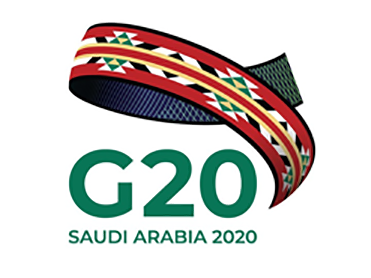
Collaborators: G20 Digital Economy Task Force and G20 Civil Society (C20)
Aim: This project aims to support the G20 Digital Economy in developing the common measure for the 2020 G20 Measurement for Digital Economy by suggesting the inclusion of digital empowerment, well-being, and sustainability indicators to the existing indicators of the Measurement through the collaboration of 750+ civil societies.
Pillar: Child Online Safety
• Download: 2020 C20 Policy Pack
• View: 2020 G20 Civil Society discussion on “Global Index for Child Online Safety and Digital Citizenship
©2025 – DQ Institute. All Rights Reserved
Information notice pursuant to Art. 13 GDPR:
Information concerning the processing of your personal data
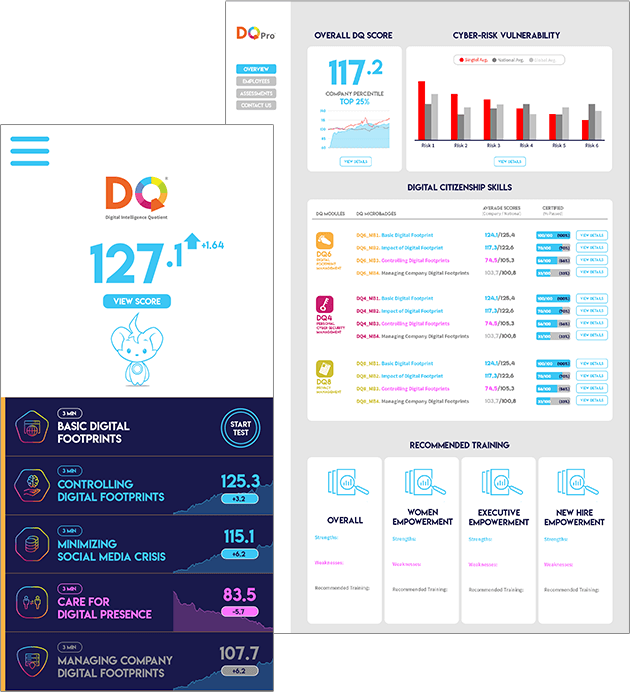
DQ Assessment was developed as a web/mobile-based platform providing assessment & analytics tools to support digital skills education/training programs to measure digital skills for individuals and organizations based on global benchmarks. It will enable:
1) Common assessments that measure the levels of multiple competencies of digital intelligence of individuals and organizations against global standards with global benchmarks
2) In-depth analysis to the end users (e.g., individuals and organizations) to identify their strengths and weaknesses through global benchmark
3) Customized digital skill development for individuals and organizations to help design customized lifelong training
DQ common assessment tools are developed based on collection of the various assessment instruments from various credible sources and existing research projects of content owner partners.
